#erp implementation
Explore tagged Tumblr posts
Text
Why Engineering Companies Need Standard ERP Solutions for Successful Implementation
In today’s fast-paced manufacturing industry, the need to streamline operations, improve efficiency, and ensure growth is paramount. Businesses, especially in the engineering and manufacturing sectors, are turning to ERP software to manage their operations effectively. Enterprise Resource Planning (ERP) software is a game-changer for manufacturers looking to grow faster by integrating their processes and providing a comprehensive solution for resource management, decision-making, and scalability. If you are a manufacturer in India or a growing business in Bhopal, partnering with the right ERP software company in Bhopal could be the key to unlocking your potential. This blog explores the benefits of ERP software for manufacturers, the role of local ERP software providers in Bhopal, and why adopting ERP solutions is essential for success in today’s competitive landscape.
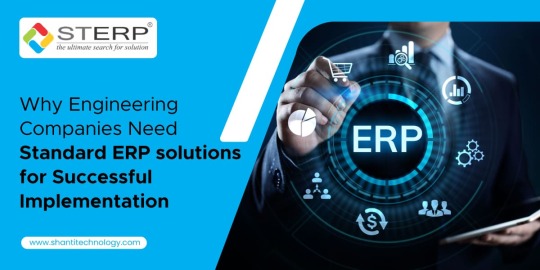
What Is ERP Software and Why Does It Matter?
ERP software is an integrated system that unifies core business processes such as procurement, inventory management, production planning, finance, and customer relationship management (CRM) into a centralized platform. This ensures seamless communication between departments, minimizes errors, and optimizes resource usage. For manufacturers, manufacturing enterprise resource planning solutions offer specific functionalities to address production scheduling, supply chain management, and quality control. These features are critical for scaling operations and improving overall business performance.
Benefits of ERP Software for Manufacturers
1. Centralized Operations
Manufacturers handle a wide range of tasks daily, from raw material procurement to final product delivery. ERP software integrates all these processes into a single platform, eliminating silos and ensuring real-time communication. Leading ERP software providers in Bhopal specialize in offering solutions tailored to manufacturing needs, ensuring smoother operations.
2. Enhanced Decision-Making
ERP systems provide accurate, real-time data through intuitive dashboards and analytics tools. This enables business leaders to make informed decisions, whether it is about production schedules, resource allocation, or financial forecasting. Engineering firms, in particular, can benefit from ERP software for engineering companies in India, which offers insights specific to their project-oriented workflows.
3. Optimized Resource Utilization
Effective resource management is critical in manufacturing. ERP software helps monitor and allocate raw materials, workforce, and equipment efficiently, reducing waste and ensuring optimal use of resources. By partnering with an engineering ERP software company in Bhopal, businesses can access customized solutions that cater to their unique requirements.
4. Improved Productivity
Automation of routine tasks, such as inventory tracking and order processing, frees up employees to focus on more strategic activities. This boost in productivity is a significant reason why manufacturers using ERP software for engineering companies experience faster growth.
5. Scalability
As manufacturing businesses grow, their operational needs become more complex. ERP systems are designed to scale with the organization, supporting additional locations, products, and services. Local ERP software companies in Bhopal provide scalable solutions that align with the growth trajectories of businesses in the region.
Why Bhopal Manufacturers Should Choose Local ERP Providers
Bhopal’s manufacturing and engineering sectors are thriving, thanks to its strategic location and growing industrial base. Local businesses stand to gain significantly by adopting ERP systems offered by experienced ERP software providers in Bhopal.
1. Tailored Solutions
Local providers understand the specific challenges faced by manufacturers in Bhopal and can customize solutions to meet their needs. For example, ERP software companies in Bhopal may offer modules tailored to local supply chains or compliance requirements.
2. On-the-Ground Support
Partnering with a local ERP software company in Bhopal ensures faster response times and personalized support during implementation and maintenance. This reduces downtime and ensures a smoother transition.
3. Cost-Effectiveness
Local ERP providers offer cost-effective solutions by eliminating the need for long-distance travel or remote troubleshooting. Businesses in Bhopal can enjoy world-class services without breaking the bank.
ERP Software for Engineering Companies in India
Engineering companies often deal with project-based operations requiring precise planning, tracking, and execution. ERP software for engineering companies in India is designed to address these needs, offering features like project management, resource scheduling, and cost tracking.
In Bhopal, collaborating with an engineering ERP software company in Bhopal ensures that local engineering firms have access to specialized solutions. These tools not only enhance operational efficiency but also improve project delivery timelines, leading to greater customer satisfaction.
ERP for Manufacturing Companies in India
India’s manufacturing sector is booming, driven by government initiatives and growing demand. To stay competitive, businesses must invest in advanced tools like ERP for manufacturing companies in India. These systems help manufacturers streamline production, manage supply chains, and maintain quality standards.
For manufacturers in Bhopal, adopting ERP software in Bhopal is a strategic move to keep pace with industry leaders. Features like real-time inventory management, production scheduling, and demand forecasting ensure businesses can respond quickly to market changes.
Real-Life Benefits of ERP Implementation
Manufacturers who implement ERP systems report:
Reduced Costs: By optimizing processes, ERP systems lower operational costs.
Faster Delivery: Improved production planning leads to quicker order fulfillment.
Better Quality: Automated quality checks ensure products meet customer expectations.
Businesses in Bhopal that have partnered with ERP software companies in Bhopal have experienced significant improvements in productivity, customer satisfaction, and revenue growth.
How to Choose the Right ERP Software Company in Bhopal
Selecting the right ERP provider is critical for a successful implementation. Here is what manufacturers should look for in an ERP software company in Bhopal:
Industry Expertise: Choose providers specializing in ERP software for engineering companies or manufacturing sectors.
Customization: Ensure the solution aligns with your unique business processes.
Local Presence: A local provider offers faster support and a better understanding of regional requirements.
Scalability: Opt for a system that can grow with your business.
Conclusion
ERP software is no longer a luxury but a necessity for manufacturers aiming to grow faster and compete effectively. By integrating operations, improving resource management, and enhancing decision-making, ERP systems empower businesses to achieve their goals. For manufacturers in Bhopal, collaborating with a trusted ERP software company in Bhopal ensures tailored solutions, cost-effectiveness, and reliable support.
Whether you are part of the engineering sector or a manufacturing enterprise, investing in manufacturing enterprise resource planning solutions will position your business for success in today’s dynamic market. Do not wait—explore the benefits of ERP software in Bhopal today and take the first step toward sustainable growth.
#ERP for manufacturing company in India#ERP implementation company in India#Best ERP implementation agecny#STERP#ERP software for engineering companies#Manufacturing enterprise resource planning#Rajkot#Surat#Ahmedabad#Gujarat#Maharashtra#Mumbai#Pune#Bhopal#Indore#Madhya Pradesh#ERP software for engineering companies in India#ERP integration#cloud ERP#ERP India#small business#ERP implementation
3 notes
·
View notes
Text
Seguridad
La seguridad informática en una Empresa que se encarga de realizar eventos es esencial para proteger la información sensible relacionada con la planificación, organización y ejecución de eventos.
Para esto indicare a continuación 8 pasos que se deben tener en cuenta:
1 Autenticación solida y control de acceso
2 Encriptación de datos
3 Actualizaciones y parches de seguridad
4 Sistema de detección de actividades sospechosas
5 Audotorias de seguridad regulares
6 Backup y recuperación de datos
7 Capacitación y concientización de los empleados
8 Gestión de proveedores
Esto con el fin de manterner salvagurdada la información de la organización, evitando programas maliciosos o virus que puedan afectar la operación.
IMPLEMENTACIÓN ERP
Para realizar la implementación de una ERP en la organización que se dedica a la realización de eventos a empresas de tecnologia, se debe tener en cuenta varios aspectos:
Se debe hacer una aevaluación de necesidades, donde se evidencie las areas que se quieren cubrir entre esas gestión de clientes, gestión de eventos, recursos humanos y contabilidad.
Investigar las soluciones de las ERP: Para esto se debe hacer una investigación de las ERP que estan en el mercado y seleccionar la que mejor se ajuste a las necesidades de la organización. entre esas esta SAP, Oracle, Eventpro, eventbrite entre otras.
Persoalización: Una vez se halla escogido la ERP que mejor se asocie a las necesidades de la empresa de eventos, esto puede requeriri la personalización de algunos modulos que se adapte al flujo de trabajo.
Implemenatación: Para esta etapa de la implemntación de la ERP se requiere migrar datos desde sistemas anteriores, en donde la capacitación del personal es escencial, para el uso del nuevo sistema, brindando herramientas de trabajo.
Pruebas: se realiza lo que conocemos como una prueba acida, en donde se evalua que el sistea funcione bien en caso de tener fallas se debe realizar las correciones pertinentes antes de hacer un lanzamiento oficial.
Lanzamiento: Una vez se halla determinado que el sistema funciona correctamente se realiza el lanzamiento oficial y de esta misma manera se estara apoyando el personal para abordar cualqueier problema que pueda surgir.
Mantenimiento: Se debe realizar mantenimiento regular al sistema, aplicar actualizaciones y realizar ajusres segun sea necesario.
Conclusiones
En conclusión la implementación de una ERP para una empresa que se encarga de realizar eventos a anivel nacional e internacional, requiere una planificación cuidadosa, un enfoque en la seguridad de la información y una capacitación adecuada del personal. Con la estrategia correcta, una ERP puede ayudar a la empresa a optimizar sus operaciones y a alcanzar sus objetivos comerciales de manera más efectiva.
Referencias
Solís Granda, I. I. (2016). Desarrollo e implementación de controles de seguridad informática para el sistema ERP Academium de la Unidad Educativa Javier, siguiendo la norma ISO 27001 (Master's thesis).
Balseca, A. S. (2014). Diseño del modelo de gestión de seguridad de la información del sistema ERP de EP Petroecuador de acuerdo a norma ISO/IEC 27002 y COBIT
Obtenido de Repositorio Digital ESPE: http://repositorio. espe. edu. ec/bitstream/21000/8152/1/AC-GRT-ESPE-047641. pdf.
Acosta Castaño, R. E. (2011). Buenas prácticas de seguridad para sistemas ERP.
Maldonado Palacios, R. C. (2015). Estudio para la implementación de un sistema ERP, análisis de la seguridad de la red al ejecutarlo.
2 notes
·
View notes
Text
Best cloud ERP software in Saudi Arabia
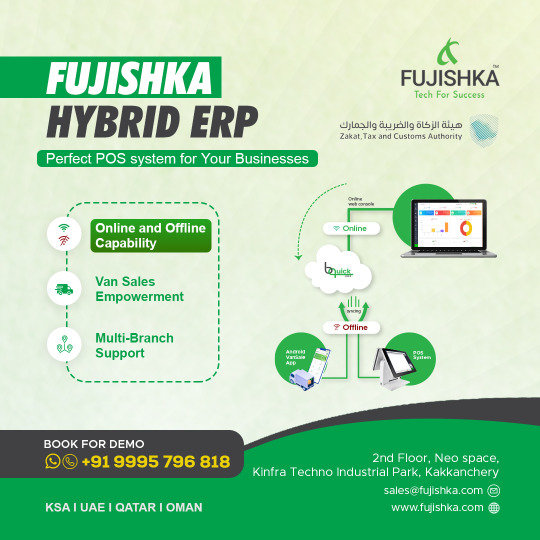
Best Cloud ERP in Saudi Arabia And Middle East
Fujishka Solutions is The best Hybrid ERP solutions
More Info: https://fujishka.com/
#erp systems#erp software uae#erp solution#erp implementation#ERP saudi arabia#saudi arabia#middle east#erp gcc
2 notes
·
View notes
Text
#odooimplementation#odoointegration#odoocustomization#erp implementation#odoo services#odoo#erp software solutions#odoodevelopment#erp solution#development#software#erpandcrmdevelopment
1 note
·
View note
Text
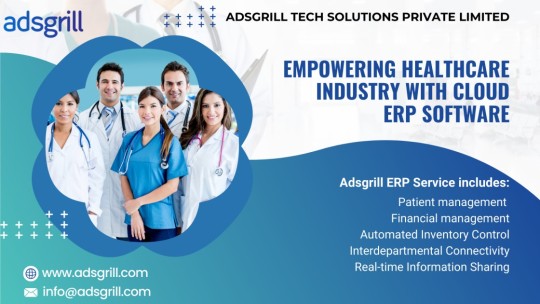
The healthcare industry plays an important role in society by offering people access to crucial medical services. These industries face several challenges that affect the healthcare industry’s capability to deliver cost-effective and efficient care. These problems, which range from regulatory difficulties to technological improvements, can have a significant impact on how healthcare is delivered and patient outcomes.
A good ERP solution unites all of the diverse parts of a complex healthcare organisation under a single roof. Each component is meant to work in tandem with the others, giving carers unrestricted access to all data across the organisation. Data can be shared across patient, pharmacy and clinician systems, as well as back-office administrative, personnel, and financial systems, allowing for better cost tracking and resource management.
#erp software#erp implementation#erp#healthcare#erp for small business#hospital erp software in saudi arabia
2 notes
·
View notes
Text

We develop supermodern real-time websites, e-shops and web applications. From simple microsites to complex system solutions.
We are bainry.
#realtime#website#ecommerce#application#web development#cms development services#crmsolutions#erp implementation#automation
2 notes
·
View notes
Text
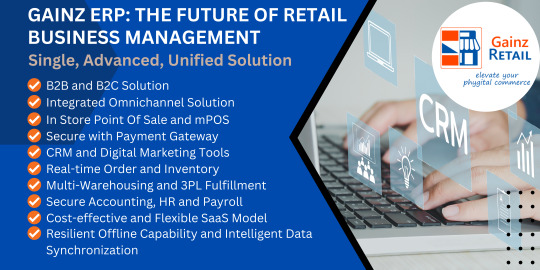
Gainz Retail ERP : The Future of Retail Business Management
We designed Gainz Retail ERP as an easy- to-use, retail business solution for in-store and online shopping.
Gainz Retail eliminates the hassle of maintaining multiple software for: POS - E-commerce - Accounting - Timesheet & Payroll
Let's show you how Gainz Retail ERP can manage your business with a single, advanced, unified solution.
for more details visit - https://www.odata.com/
#cloud erp#erp for small business#erp implementation#erp software#erpdevelopment#erpcompany#erp#erpsolutions#canada#sap erp#saas technology#saas application development#saascompany#saas software#saas app development company#retail pos software#retail store#retail business#retail erp software
2 notes
·
View notes
Text
Building an ERP System: A Comprehensive Step-by-Step Guide
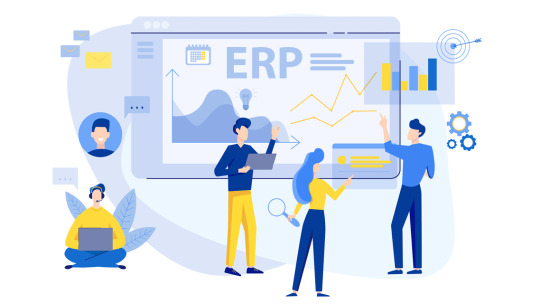
#application#development#software#software development#erpcloud#erp implementation#erp software#erp consultant#sap erp
2 notes
·
View notes
Text
How to Discover the ROI of ERP Implementation Projects?
Determining the return on investment (ROI) of an enterprise resource planning (ERP) system involves a process of analyzing the expected benefits against the costs of implementing and operating the system.
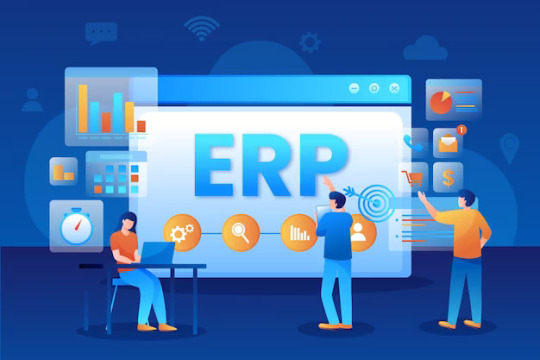
How to Calculate ROI of ERP Project?
Calculating the return on investment (ROI) for an enterprise resource planning (ERP) system involves comparing the expected benefits of the ERP implementation against its total cost.
Here are the steps to calculate ERP ROI:
Determine the total cost of the ERP implementation, including software licenses, hardware, consulting fees, employee training costs, and any other associated expenses.
Identify the expected benefits of the ERP implementation, such as increased efficiency, improved decision-making capabilities, reduced costs, increased productivity, and improved customer satisfaction.
Assign a monetary value to each expected benefit. For example, if the expected benefit is increased efficiency, calculate the potential cost savings associated with reducing manual efforts and eliminating duplicate data entry.
Estimate the time it will take to achieve each benefit and calculate the annual benefit for each benefit category.
Calculate the total expected annual benefit by adding up the annual benefits for each benefit category.
Subtract the total cost of the ERP implementation from the total expected annual benefit to get the total net benefit.
Divide the total net benefit by the total cost of the ERP implementation and multiply the result by 100 to get the ERP ROI percentage.
For example, if the total cost of the ERP implementation is $500,000 and the total expected annual benefit is $750,000, the total net benefit would be $250,000 ($750,000 - $500,000). The ERP ROI would be 50% ($250,000/$500,000 x 100). This means that for every dollar invested in the ERP system, the organization can expect to receive a return of 50 cents. It is important to note that the ROI calculation should take into account both short-term and long-term benefits and costs to get a comprehensive view of the ROI.
Determine the ROI of an ERP system
Here are the steps to determine the ROI of an ERP system:
Define the goals of the ERP system: Start by defining the goals of the ERP system, such as reducing operating costs, improving productivity, or enhancing customer service.
Identify the costs of the ERP system: Determine the total cost of the ERP system, including software licensing, hardware, consulting fees, employee training, and any other associated expenses.
Quantify the benefits of the ERP system: Identify the potential benefits of the ERP system, such as reduced operating costs, improved productivity, and increased revenue. Assign a monetary value to each benefit based on the potential financial impact on the organization.
Estimate the time to achieve benefits: Determine the time it will take to achieve each benefit and calculate the annual benefit for each benefit category.
Calculate the total expected annual benefit: Add up the annual benefits for each benefit category to get the total expected annual benefit.
Calculate the net present value (NPV) of the ERP system: Calculate the present value of the expected benefits minus the present value of the expected costs, using a discounted cash flow (DCF) analysis.
Calculate the ROI: Divide the NPV by the total cost of the ERP system and multiply by 100 to get the ROI percentage.
Conclusion:
ERP implementation can help you in many ways but without the calculation of Return on investment then you spend is totally lost. So make sure you have a good volume of return before investing in the ERP implementation. If you are planning to ERP implementation definitely you will conclude with the best oracle ERP cloud implementation, choose the service who has a year of expertise in oracle ERP implementation and the relevant field.
#erp implementation#erpcloud#erp software#erp implementation service#best erp implementation service#oraclecloudinfrastructure#oraclecloud#oracle implementation#erp modules#ERP software implementation
2 notes
·
View notes
Text
#erp#erp software#erp system#erp implementation#erp solutions#cloud erp#erp integration#erpsolutions#erp for manufacturing#erp development company
0 notes
Text
Choosing the Best ERP Software in Bangladesh: A Complete Guide
Selecting the best ERP software in Bangladesh is essential for businesses aiming to enhance productivity and streamline operations. Whether you require a custom ERP software tailored to your unique needs or a pre-built ERP solution, making the right choice can drive efficiency and growth.
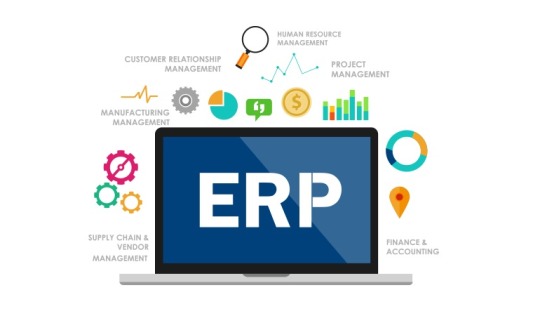
Why Your Business Needs an ERP Solution
An ERP system integrates core business functions such as finance, inventory, HR, and sales into a single, efficient platform. The right ERP solution helps businesses: ✅ Automate repetitive tasks and improve workflow efficiency. ✅ Gain real-time insights for smarter decision-making. ✅ Reduce operational costs and increase profitability.
Best ERP Software for Small Businesses
For small and medium-sized businesses, selecting the best ERP software for small business is crucial. The ideal ERP should be: 🔹 Budget-friendly and easy to implement. 🔹 Customizable to match specific business requirements. 🔹 Cloud-based for enhanced accessibility and remote management.
Finding the Right ERP Provider in Bangladesh
Choosing a trusted software company in Bangladesh ensures you get a robust ERP system that meets your business goals. Look for a software development company in Bangladesh that offers: ✔ Industry-specific ERP customization. ✔ Reliable technical support and regular system updates. ✔ Scalable solutions that grow with your business.
Final Thoughts
Collaborating with the best software company in Bangladesh guarantees an ERP system that optimizes operations and drives success. What features do you look for in an ERP solution? Share your thoughts! 🚀
#web app development#website design development#website development#offshore company setup#offshore software development#software development#erp software#erp system#erp solution bd#erp implementation#erp integration#crm software#businesssolutions#analytics
0 notes
Text
Best Odoo Implementation Services
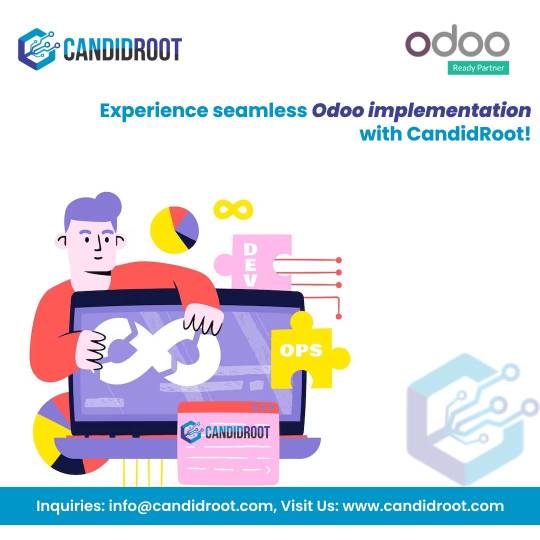
🔧 Unlock Your Business Potential with Expert Odoo Implementation!
🚀 Say goodbye to inefficiencies and hello to streamlined processes. With our Odoo Implementation Services, we ensure your business gets the perfect setup for success.
🎯 What We Offer:✅ Customized Odoo solutions tailored to your needs. ✅ Hassle-free setup and seamless integration. ✅ Comprehensive training and 24/7 support.
💼 Whether you're upgrading from outdated systems or starting fresh, we’ll guide you every step of the way to maximize your ROI.
🌟 Ready to transform the way you work? Let’s make it happen together!
📩 DM us or visit https://www.candidroot.com/odoo-implementation to schedule a consultation today.
#OdooImplementation #OdooERPImplementation #OdooImplementationServices #BusinessSolutions #ERPExperts #DigitalTransformation #Odoo #CandidRootSolutions
#odoo#odoo implementation#odoo implementation services#odoo implementation company#odoo erp#erpsoftware#erp system#businessolutions#erp implementation
0 notes
Text
1 note
·
View note
Text

The blog explains how Frolick transformed its operations by adopting a customized ERP functional consulting services from Contetra. Initially, Frolick faced challenges with inefficient manual processes and fragmented systems that slowed down productivity. By implementing a tailored ERP system, the company was able to integrate its disparate functions, automate routine tasks, and achieve real-time reporting. This transformation not only streamlined operations but also empowered Frolick with the insights needed for faster, data-driven decision-making. Ultimately, the ERP implementation paved the way for improved operational efficiency and set the stage for sustainable growth and scalability.
#erp implementation consultants#erp functional consultant#erp functional consulting services#erp selection consultants#erp software#erp system#erp implementation#erp integration#erp system implementation
0 notes
Text
ERP Implementation Company in Canada
Fullword Technologies, a trusted ERP Implementation Company in Canada, empowers businesses to streamline and optimize their operations with customized ERP solutions. Our expert team ensures seamless integration, enhanced workflow efficiency, and improved data accuracy. With deep industry insights and technical expertise, we deliver reliable, efficient, and scalable ERP implementation services designed for lasting business success. Let us help you transform your operations with a cutting-edge ERP solution.

0 notes
Text
Best ERP Software Company in India
DiracERP delivers world-class ERP solutions for Furniture, Lighting, Home Décor, Home Essentials, Manufacturing, Supply Chain, and Service sectors—serving 250+ clients worldwide with seamless integration, efficiency, and sustainable growth. For more details, visit https://diracerp.com/
0 notes